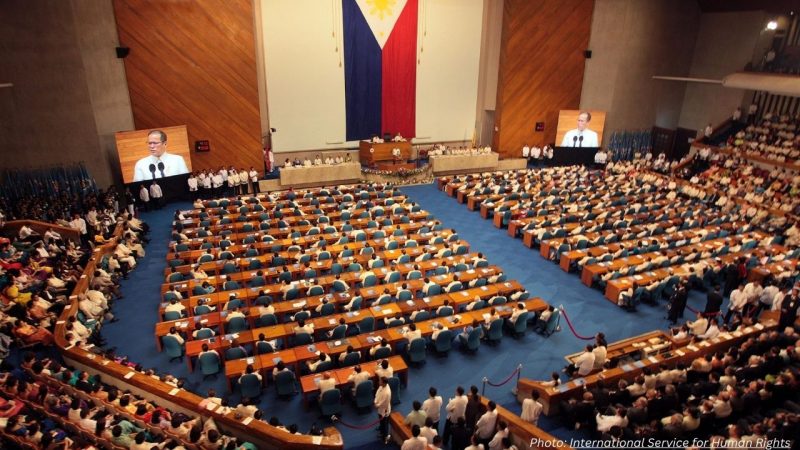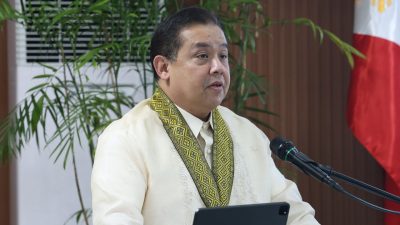MANILA – The National Grid Corporation of the Philippines (NGCP) is again in hot water on Wednesday during the inquiry of the Senate Committee on Energy which expressed doubts that its Filipino shareholders are still in control of the company.
NGCP, which is now a privately owned corporation in charge of operating, maintaining and developing the country’s state-owned power grid, is 60 percent owned by a group of Filipino businessmen and 40 percent by the State Grid Corporation of China (SGCC).
The panel’s chairperson, Sen. Raffy Tulfo, was the first one to ask the NGCP representatives if the company requires that during its board meetings, representatives of its Chinese shareholders should be present or else no decision can be made.
“In the event na may absent po na representative from State Grid Corporation of China, hindi po natutuloy yung board meeting kahit meron nang quorum? Kahit ang majority andun na? Kailangan andun yung Chinese representative dahil kung wala, cancelled yung meeting (that a representative from SGCC is absent, the board meeting will not push through even if there is already a quorum? Even if the majority is there? Should the Chinese representative be there, because if not, the meeting will be cancelled)?” Tulfo asked.
NGCP corporate secretary Ronald Dylan Concepcion denied the accusation saying that under the company’s by-laws, the quorum is 51 percent and all of the board members have been present in all of their board meetings.
Tulfo went on to allege that NGCP gives special consideration to SGCC representatives who are in the minority considering that Filipinos are the major shareholders.
“It is not actually the tyranny of the minority in that instance. It’s actually to protect the interest of the minority from the majority who might railroad decisions, especially on issues that involve the expertise like technical issues. That’s just the protection that the agreement provides the Chinese. It’s not that we are giving them more power or we’re favoring them,” Concepcion responded.
“In fact, under that agreement and our bylaws, it is still the 60 percent that controls because the 60 percent are Filipinos, Mr. Chairman (referring to Tulfo),” he added.
Out of the 10 members of the NGCP’s Board of Directors, four are Chinese nationals representing the SGCC.
Dividends
Tulfo also took notice of the dividends that the members of NGCP’s Board receive which he said is not commensurate to the poor service it provides for the Filipinos.
“Kung sana maganda po yung pamamalakad ninyo, maganda yung serbisyo at walang brownout, walang reklamo, okay lang po kayong kumita because alam ko po na kailangan ng lahat ng kompanya kumita (If only you manage well with good service and there are no brownouts, or complaints, it’s okay to earn because I know that all companies need to earn). That’s the purpose of business – to make money. Yun po ang sinasabi ko iskandaloso na po ang dating sa taumbayan (That’s what I have been telling that is scandalous on the part of the public),” the lawmaker stressed without mentioning the particular amount of dividends that each member of NGCP’s Board receives.
Sen. Sherwin Gatchalian, who sits as the vice chairperson of the panel, lectured the NGCP representatives in the inquiry about how the company’s Board should work in accordance with the Constitution.
“The Constitution is very clear that 60 percent should be owned by Filipinos and the reason for that is because Filipinos should make the decisions. But how can they make the decision if they cannot convene?” Gatchalian asked.
“So in this case, parang nabalewala yung pagiging majority ng mga Pilipino kasi ang desisyon ultimately ay andun sa (it seems like the Filipinos, being in the majority, became useless because the decision ultimately comes from the) minority,” Tulfo added.
In an interview after the panel’s previous hearing, Tulfo said he received information from the intelligence community that China can control the power transmission in the Philippines with “just a push of a button”.
“Later on, nagkasanga-sanga na lang and nakita ko yung iba’t iba pang mga problema na dapat ayusin (I saw more problems that need to be addressed),” the lawmaker said assuring that his committee will prove NGCP’s violations and will subpoena documents if necessary,” he said.
In several instances, Tulfo shared that the SGCC vetoed the decisions made by the Filipino members of the NGCP Board.
The National Transmission Corporation (TransCo), a government-owned-and-controlled corporation, used to operate and manage the power transmission system that links power plants to the electric distribution utilities nationwide until Republic Act (RA) 9136 was passed into law in 2001 mandating its privatization through an outright sale or management concession agreement.
Following a public bidding conducted in December 2007, the TransCo concession was awarded to the NGCP which eventually secured a congressional franchise to operate the transmission network through RA 9511.
On Jan. 15, 2009, TransCo turned over the management and operation of its nationwide transmission system to NGCP. (PNA)







